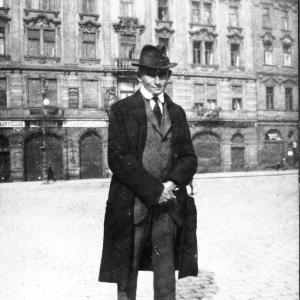The Interpreter: Oliver Jahraus on “Kafkaesque”
12 Jul 2024
LMU researchers explain scientific terms in a generally understandable way
12 Jul 2024
LMU researchers explain scientific terms in a generally understandable way
Some scholarly terms have made it into everyday discourse. Here, LMU researchers tell us what these expressions mean – and not just with a definition, but also a brief account of how they entered the vernacular.
Oliver Jahraus: “It’s unusual for an author’s name to spawn an adjective. For this to happen, first their work must be extremely well known. This is true in spades of Franz Kafka’s novels, stories, and even his diaries. Secondly, there needs to be a specific conception of the work that brands itself on people’s minds. This can be based on a highly abstracted sense of the narrative and lead to simplified judgments, to sentences like: ‘Kafka is bleak,’ ‘Kafka is about futility and absurdity.’ ‘Kafka shows how we’re condemned to fail in the face of powers we do not understand – such as bureaucracies.’

Prof. Dr. Oliver Jahraus is Vice President of Studies at LMU and has published several books on the work of Franz Kafka. | © LMU
And then you get an adjective like ‘Kafkaesque,’ which has long floated free of any direct reference to Kafka and appears today in all kinds of contexts. Kafkaesque – this designates an experience of the incomprehensible and therefore threatening, the illogical and therefore irrational, a power that governs you but which you do not understand and perhaps cannot even perceive.
But we need to be careful here. The word Kafkaesque is not the adjective form of Kafka, but the adjective form of – and this sounds rather tautological – the Kafkaesque itself – that is to say, this conception we have of him. Kafka justifies such a distinction, as the man himself, his life and his work, are not Kafkaesque. The Kafkaesque Kafka is a myth. Kafka was not somebody who despaired of the world and saw it as gloomy and meaningless. He was not socially isolated – indeed the opposite was true. His biography can reveal some things, but it is not the interpretative key to his work.

Kafka was a lawyer and civil servant. He wrote his literary texts in his spare time. | © IMAGO / agefotostock / Universal Images Group Sovfoto / UIG
And when Kafka deliberately lays down a scent – such as naming his protagonists in The Trial and The Castle ‘Josef K’ or just ‘K’, to cite only the simplest trick – we shouldn’t fall for these ploys. The most famous trap he constructs concerns his father. Overbearing father figures who drive their sons to death and suicide are a recurring feature of his work. And when he writes his Letter to Father, a genuine letter, incidentally, which he actually intended his father to receive, this too is filled with exaggerations.
Kafka’s texts challenge readers to interpret while withholding unambiguous meaning. Precisely by doing this, he renders a world – a Kafkaesque world – transparent. Kafka pushed this game to the nth degree, which is what makes him so modern.”
Prof. Oliver Jahraus is Chair of Modern German Literature and Media and Vice President for Teaching and Studies at LMU. He has published several books on the work of Franz Kafka, most recently Franz Kafka. 100 Seiten.